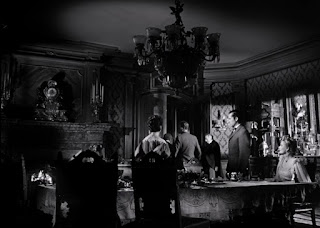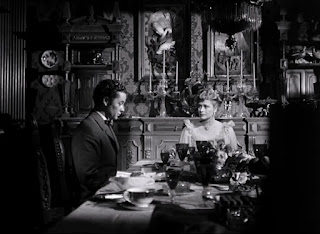The Story: An old fashioned family dinner with a side-dish of cruelty passed around. That's what we're served in this scene from one of the un-altered sections of Orson Welles' tantalizing The Magnificent Ambersons, one of the great sacrifices to commerce and studio politics in the history of cinema. One day, we may get to see the original work-print edit of Ambersons, sent to Welles in Brazil (where he was making a film for the government to improve South American relationships—the also-legendary It's All True), the one unaltered print before a disastrous audience preview brought out the long knives at RKO Studios to butcher 45 minutes out of it. New sequences were filmed (without Welles' input) and the ending of the original picture was tossed out with the trash, destroyed as per studio policy.
It's an almost-appropriate fate for a movie about made with nostalgia about an old way of life, run over by the mechanisms of time and fortune and the Industrial Age, The Gilded Age being smudged and flaked by the exhaust and sulfates that emanated from it. Any niceties could only be crushed in the gears of it.
But, the Gilded Age wasn't 24 karat. Look at this scene. Although manners require that no elbows be on the table, that doesn't prevent sarcasm, sniping, and japes from darkening the conversation. Heaping scorn on one party at the table only encourages him to save face by heaping scorn on another, even if that party is an honored guest. The fact is, although young (spoiled) George Amberson actually may not like the automobile, what he truly doesn't like is one of the people involved in its development, an old flame of his mother's, who is now—now that she is widowed—back in the frame of her affections. This he will not countenance and so he attacks (although he denies it).
The fact is, whatever was golden about the Gilded Age is already corroded, and not so much from outside forces (although they are certainly present) but from within, when character is less valued than what one has on deposit.
And, as far as Eugene Morgan's little speech is concerned, one is nostalgic that society-changing entrepreneurs could not only be smart, but also wise.
The Set-up: The Ambersons and the Minafers and the Morgans. Eugene Morgan (Joseph Cotten) loves Isabel Minafer (Dolores Costello), Aunt Fanny Amberson (Agnes Moorehead) loves Eugene, too, and is jealous of his affection for Isabel. Isabel's son, George (Tim Holt) loves Eugene's daughter Lucy (Anne Baxter). With so much love, it's inevitable that Cupid's a little too busy to aim straight and a couple of arrows miss their mark and cause some real damage.
Action.
INTERIOR – DINING ROOM – AMBERSON MANSION – DAY – (1905)
The whole family is present, and Eugene is a guest. They are just finishing their dessert.
MAJOR AMBERSON
Probably afraid to.
JACK
Eugene I hear somebody’s opened up another horseless carriage shop somewhere out in the suburbs.
MAJOR AMBERSON
I suppose they’ll either drive you out of the business, or else the two of you’ll drive all the rest of us off the streets.
MAJOR AMBERSON
How do you propose to do that?
EUGENE
It isn’t the distance from the center of a town that counts, it’s the time it takes to get there. This town’s already spreading; automobiles are going to carry city streets clear out to the county line.
JACK (skeptically)
I hope you’re wrong, because if people go to moving that far, real estate values here in the old residence part of town are going to be stretched pretty thin.
EUGENE It may be that they won’t add to the beauty of the world, nor to the life of men’s souls. I am not sure.
EUGENE But automobiles have come, and almost all outward things are going to be different because of what they bring.
EUGENE They’re going to alter war, and they’re going to alter peace. EUGENE I think men’s minds are going to be changed in subtle ways because of automobiles.
EUGENE It may be that ten or twenty years from now, if we can see the inward change in men by that time,
FANNY Oh, Eugene
Murmured “good-byes” —
MAJOR AMBERSON
I’ll see you to the door.
EUGENE
Don’t bother, sir, I know the way.
GEORGE
I don’t see why he should be. I didn’t say anything about him. GEORGE
He didn’t seem to me to be hurt — seemed perfectly cheerful. What made you think he was hurt?
JACK
It’s a new style of courting a pretty girl, I must say, for a young fellow to go deliberately out of his way
Words by Orson Welles (after Booth Tarkington)
Pictures by Stanley Cortez and Orson Welles
The Magnificent Ambersons is available on DVD and Blu-Ray from The Criterion Collection.





















































































No comments:
Post a Comment